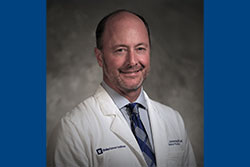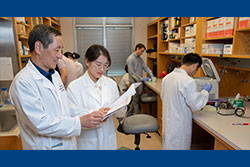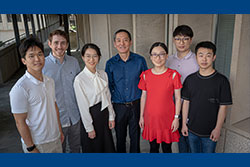Philanthropy Moves the Needle on Creating Novel Therapies for Prostate Cancer

A generous donor, who wishes to remain anonymous, hopes to move the needle on prostate cancer research at Duke. Their $1 million gift in the form of unrestricted funds for prostate cancer research, will support the work of Jiaoti Huang, MD, PhD, Johnston-West Endowed Department Chair of Pathology, to conduct prostate cancer research in partnership with the Duke Cancer Institute’s (DCI) Center for Prostate and Urologic Cancers. The prostate cancer experts at the Center are members of Duke’s nationally-ranked urology and medical oncology programs, and as a top referral center, they specialize in difficult-to-treat cancers.
Prostate cancer is the most common cancer among men in the United States, with more than 192,000 cases diagnosed each year, which translates to one in seven men being diagnosed during their lifetimes. Major challenges exist within the areas of screening, diagnosis, and treatment. The collaborative powerhouse of Duke Pathology, joined together with the Center, addresses these challenges on a daily basis.
Huang is an internationally renowned prostate cancer pathologist and researcher who has spent over two decades studying strategies for targeting neuroendocrine cells to improve prostate cancer treatment. Huang’s research has been funded at a high level by the federal government and private foundations. This significant philanthropic donation will provide the Huang Lab the resources to pursue high-risk, high-reward projects that have the biggest impact on prostate cancer care.
The Research

A subset of prostate cancer cells, known as neuroendocrine cells, is resistant to hormonal therapy. The Huang Lab has identified a novel target called CXCR2 on these cells, which could lead to better targeting of cancer to prevent and treat metastatic spread while minimizing side effects, which piqued the donors’ interest.
The work was done in collaboration with Andrew Armstrong, MD, director of Research for the DCI Center for Prostate and Urologic Cancers. Armstrong, along with Daniel George, MD, director of the Center for Prostate and Urologic Cancers, are long-time collaborators with the Huang Lab. To translate their discovery from lab to the bedside, the group has been working with a biotech company to start a clinical trial at Duke, sponsored by a multi-million dollar grant from the NIH.
“Prostate cancer can develop resistance to hormonal therapies and evade the immune system through upregulation of the chemokine receptor CXCR2, and this resistance pathway can be targeted through precision therapies,” said Armstrong. “We’re seeking to prevent hormone therapy resistance and immune evasion simultaneously by combining hormonal therapy with CXCR2 blockade in this new multicenter clinical trial. The Huang Lab continues to identify new targets that promote aggressive prostate cancer, and which are suitable for new therapies that we’re bringing to our patients.”

George is excited by the interactions between Industry and academic researchers. “Smaller pharmaceutical companies are resource-constrained, and frequently rely on collaborations with academic researchers in order to accelerate the development of their agent into unforeseen and potentially groundbreaking indications. The CXCR2 story in prostate cancer is a great example of such a win-win relationship between industry and academics,” said George.
“This philanthropy bridges a funding gap to help us go into unchartered territory,” said Huang. “We’re developing novel therapeutics against a new target we’ve discovered. It’s normally not within the scope of a research lab to do this type of work due to resource constraints, but philanthropic support makes it possible.”
A Long-Term Relationship
This gift stems from a personal relationship the donor established with Huang, who met the family when he was doing clinical research at the University of California Los Angeles.
“They started learning what I was doing in the research lab, and I shared with them how we had discovered fundamental mechanisms for prostate cancer and how we’ve been trying to develop novel therapies with little to no side effects,” recalled Huang.

“We have a personal family story about our interest in Dr. Huang’s prostate cancer research,” shared the donor. “My husband’s father was diagnosed with prostate cancer when he was in his early 80s. We were heartbroken when he felt how much time he had left with us was totally in God’s hands. We wanted him to have hope, and Dr. Huang’s research gave us exactly what we were so desperately looking for. Through my father-in-law’s story, we learned there were so many more old-aged people like him suffering the same physical and psychological torment."
In 2016, Huang moved from Los Angeles, California, to Durham, North Carolina, and kept in touch to follow the Huang Lab’s research. “We, along with our other friends, were impressed that Duke had such a charm that Dr. Huang and his family were willing to leave LA, where the weather cannot be better,” said the donor. “He is now the leading prostate cancer researcher at Duke. Through learning about his career story and supporting his research at Duke, we are convinced about Duke’s dedication and leading role in cancer research and feel proud of being connected with Duke through this way.”
The donor appreciates Huang’s long-term commitment to finding treatment, and his dedication to patients; in classrooms teaching residents, fellows, PhD candidates and post-doctoral students; and as a department leader.
“We certainly hope Dr. Huang’s lab can have tangible medical outcomes as soon as possible,” said the donor. “We dreamed that my husband’s father could have the option of using medical treatments that might be outcomes of his research, although we understand that any research must go through a lengthy and complicated process before it can be applied to reality.”

“The one thing I love very much is my ability to do research,” said Huang. “I can help advance the field and the results will benefit patients. Duke has a great infrastructure and a collaborative culture to perform cutting-edge research. I benefit from interacting with the many smart and caring people who work here. We have different clinical experiences and educational and research backgrounds. When we interact, novel ideas are born. For me that is very stimulating. It is very gratifying to see the needle move in a positive direction as a result.”
“Supporting Dr. Huang’s research is so meaningful not only to my family but also to a large portion of population,” said the donor. “We are certain that we put our resource to where it is most needed, and are so glad that we can contribute to the advancement of the most advanced medical research, no matter how small our effort is. This is our first-time philanthropic effort. We are still learning from it.”